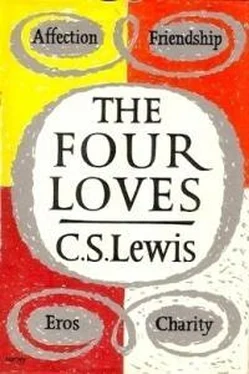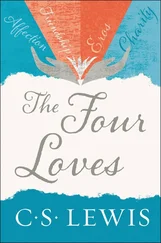Thus God, admitted to the human heart, transforms not only Gift–love but Need–love; not only our Need–love of Him, but our Need–love of one another. This is of course not the only thing that can happen. He may come on what seems to us a more dreadful mission and demand that a natural love be totally renounced. A high and terrible vocation, like Abraham's, may constrain a man to turn his back on his own people and his father's house. Eros, directed to a forbidden object, may have to be sacrificed. In such instances, the process, though hard to endure, is easy to understand. What we are more likely to overlook is the necessity for a transformation even when the natural love is allowed to continue.
In such a case the Divine Love does not substitute itself for the natural—as if we had to throw away our silver to make room for the gold. The natural loves are summoned to become modes of Charity while also remaining the natural loves they were.
One sees here at once a sort of echo or rhyme or corollary to the Incarnation itself. And this need not surprise us, for the Author of both is the same. As Christ is perfect God and perfect Man, the natural loves are called to become perfect Charity and also perfect natural loves. As God becomes Man "Not by conversion of the Godhead into flesh, but by taking of the Manhood into God", so here; Charity does not dwindle into merely natural love but natural love is taken up into, made the tuned and obedient instrument of, Love Himself.
How this can happen, most Christians know. All the activities (sins only excepted) of the natural loves can in a favoured hour become works of the glad and shameless and grateful Need–love or of the selfless, unofficious Gift–love, which are both Charity. Nothing is either too trivial or too animal to be thus transformed. A game, a joke, a drink together, idle chat, a walk, the act of Venus—all these can be modes in which we forgive or accept forgiveness, in which we console or are reconciled, in which we "seek not our own". Thus in our very instincts, appetites and recreations, Love has prepared for Himself "a body".
But I said "in a favoured hour". Hours soon pass. The total and secure transformation of a natural love into a mode of Charity is a work so difficult that perhaps no fallen man has ever come within sight of doing it perfectly. Yet the law that loves must be so transformed is, I suppose, inexorable.
One difficulty is that here, as usual, we can take a wrong turn. A Christian—a somewhat too vocally Christian—circle or family, having grasped this principle, can make a show, in their overt behaviour and especially in their words, of having achieved the thing itself—an elaborate, fussy, embarrassing and intolerable show. Such people make every trifle a matter of explicitly spiritual importance—out loud and to one another (to God, on their knees, behind a closed door, it would be another matter). They are always unnecessarily asking, or insufferably offering, forgiveness. Who would not rather live with those ordinary people who get over their tantrums (and ours) unemphatically, letting a meal, a night's sleep, or a joke mend all? The real work must be, of all our works, the most secret. Even as far as possible secret from ourselves. Our right hand must not know what our left is doing. We have not got far enough if we play a game of cards with the children "merely" to amuse them or to show that they are forgiven. If this is the best we can do we are right to do it. But it would be better if a deeper, less conscious, Charity threw us into a frame of mind in which a little fun with the children was the thing we should at that moment like best.
We are, however, much helped in this necessary work by that very feature of our experience at which we most repine. The invitation to turn our natural loves into Charity is never lacking. It is provided by those frictions and frustrations that meet us in all of them; unmistakable evidence that (natural) love is not going to be "enough"—unmistakable, unless we are blinded by egotism. When we are, we use them absurdly. "If only I had been more fortunate in my children (that boy gets more like his father every day) I could have loved them perfectly." But every child is sometimes infuriating; most children are not infrequently odious. "If only my husband were more considerate, less lazy, less extravagant" … "If only my wife had fewer moods and more sense, and were less extravagant" … "If my father wasn't so infernally prosy and close–fisted." But in everyone, and of course in ourselves, there is that which requires forbearance, tolerance, forgiveness. The necessity of practising these virtues first sets us, forces us, upon the attempt to turn—more strictly, to let God turn—our love into Charity. These frets and rubs are beneficial. It may even be that where there are fewest of them the conversion of natural love is most difficult. When they are plentiful the necessity of rising above it is obvious. To rise above it when it is as fully satisfied and as little impeded as earthly conditions allow—to see that we must rise when all seems so well already—this may require a subtler conversion and a more delicate insight. In this way also it may be hard for "the rich" to enter the Kingdom.
And yet, I believe, the necessity for the conversion is inexorable; at least, if our natural loves are to enter the heavenly life. That they can enter it most of us in fact believe. We may hope that the resurrection of the body means also the resurrection of what may be called our "greater body"; the general fabric of our earthly life with its affections and relationships. But only on a condition; not a condition arbitrarily laid down by God, but one necessarily inherent in the character of Heaven: nothing can enter there which cannot become heavenly. "Flesh and blood," mere nature, cannot inherit that Kingdom. Man can ascend to Heaven only because the Christ, who died and ascended to Heaven, is "formed in him". Must we not suppose that the same is true of a man's loves? Only those into which Love Himself has entered will ascend to Love Himself. And these can be raised with Him only if they have, in some degree and fashion, shared His death; if the natural element in them has submitted—year after year, or in some sudden agony—to transmutation. The fashion of this world passes away. The very name of nature implies the transitory. Natural loves can hope for eternity only in so far as they have allowed themselves to be taken into the eternity of Charity; have at least allowed the process to begin here on earth, before the night comes when no man can work. And the process will always involve a kind of death. There is no escape. In my love for wife or friend the only eternal element is the transforming presence of Love Himself. By that presence, if at all, the other elements may hope, as our physical bodies hope, to be raised from the dead. For this only is holy in them, this only is the Lord.
Theologians have sometimes asked whether we shall "know one another" in Heaven, and whether the particular love–relations worked out on earth would then continue to have any significance. It seems reasonable to reply: "It may depend what kind of love it had become, or was becoming, on earth." For, surely, to meet in the eternal world someone for whom your love in this, however strong, had been merely natural, would not be (on that ground) even interesting. Would it not be like meeting in adult life someone who had seemed to be a great friend at your preparatory school solely because of common interests and occupations? If there was nothing more, if he was not a kindred soul, he will now be a total stranger. Neither of you now plays conkers. You no longer want to swop your help with his French exercise for his help with your arithmetic. In Heaven, I suspect, a love that had never embodied Love Himself would be equally irrelevant. For Nature has passed away. All that is not eternal is eternally out of date.
Читать дальше











